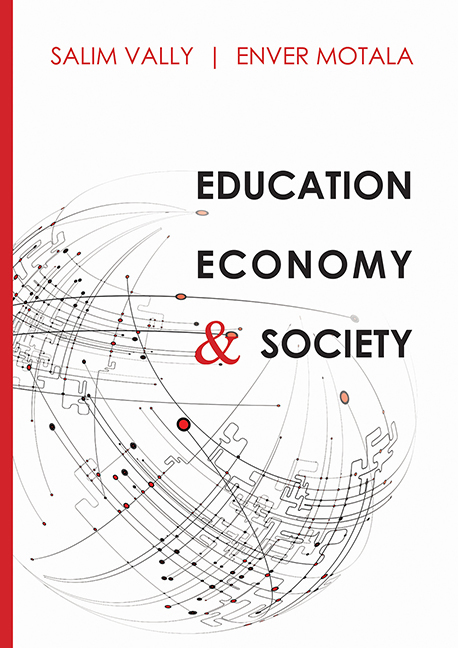Book contents
- Frontmatter
- Contents
- Foreword
- Preface
- About the contributors
- Acknowledgements
- Abbreviations and acronyms
- Chapter 1 ‘NO ONE TO BLAME BUT THEMSELVES’: Rethinking the Relationship between Education, Skills and Employment
- Chapter 2 EDUCATION AND ECONOMY: Demystifying the Skills Discourse
- Chapter 3 UNIVERSITIES AND THE ‘KNOWLEDGE ECONOMY’
- Chapter 4 GOING AROUND IN CIRCLES: Employability, Responsiveness, and the Reform of the College Sector
- Chapter 5 BUILDING A TRANSFORMATIVE PEDAGOGY in Vocational Education
- Chapter 6 SKILLS? WHAT SKILLS? JOBS? WHAT JOBS? An Overview of Research into Education/Labour Market Relationships
- Chapter 7 DEBATING THE NEXUS of Education, Skills and Technology in the Age of Lean Production: A Case Study of the ArcelorMittal Vanderbijlpark Plant
- Chapter 8 SKILLS, JOBS AND DECEPTION: Examples from the South African Workplace
- Chapter 9 ON THE USE AND ABUSE OF EDUCATION: Reflections on Unemployment, the ‘Skills Gap’ and ‘Zombie Economics’
- Chapter 10 THE YOUTH WAGE SUBSIDY in South Africa: Employment, Skills and ‘Churning’
- Chapter 11 EPISTEMIC INJUSTICE and the Struggle for Recognition: Human Dignity and the Recognition of Prior Learning
- Chapter 12 (RE)CLAIMING WORKERS' EDUCATION
- Chapter 13 SKILLS DEVELOPMENT in Post-Apartheid South Africa: Issues, Arguments and Contestations
- Index
Chapter 9 - ON THE USE AND ABUSE OF EDUCATION: Reflections on Unemployment, the ‘Skills Gap’ and ‘Zombie Economics’
Published online by Cambridge University Press: 16 February 2020
- Frontmatter
- Contents
- Foreword
- Preface
- About the contributors
- Acknowledgements
- Abbreviations and acronyms
- Chapter 1 ‘NO ONE TO BLAME BUT THEMSELVES’: Rethinking the Relationship between Education, Skills and Employment
- Chapter 2 EDUCATION AND ECONOMY: Demystifying the Skills Discourse
- Chapter 3 UNIVERSITIES AND THE ‘KNOWLEDGE ECONOMY’
- Chapter 4 GOING AROUND IN CIRCLES: Employability, Responsiveness, and the Reform of the College Sector
- Chapter 5 BUILDING A TRANSFORMATIVE PEDAGOGY in Vocational Education
- Chapter 6 SKILLS? WHAT SKILLS? JOBS? WHAT JOBS? An Overview of Research into Education/Labour Market Relationships
- Chapter 7 DEBATING THE NEXUS of Education, Skills and Technology in the Age of Lean Production: A Case Study of the ArcelorMittal Vanderbijlpark Plant
- Chapter 8 SKILLS, JOBS AND DECEPTION: Examples from the South African Workplace
- Chapter 9 ON THE USE AND ABUSE OF EDUCATION: Reflections on Unemployment, the ‘Skills Gap’ and ‘Zombie Economics’
- Chapter 10 THE YOUTH WAGE SUBSIDY in South Africa: Employment, Skills and ‘Churning’
- Chapter 11 EPISTEMIC INJUSTICE and the Struggle for Recognition: Human Dignity and the Recognition of Prior Learning
- Chapter 12 (RE)CLAIMING WORKERS' EDUCATION
- Chapter 13 SKILLS DEVELOPMENT in Post-Apartheid South Africa: Issues, Arguments and Contestations
- Index
Summary
We need a better-educated citizenry, but the cure for increasing inequality lies elsewhere
— Lawrence MishelIntroduction
Much of the space of public policy discourse in South Africa is currently occupied by anxious discussions of the so-called ‘triple crisis’ of ‘poverty, inequality and unemployment’. Almost invariably, such discussions tend also to invoke an additional, adjunct ‘crisis in education’. Most often, these are linked by an assumption that the crisis in education must be addressed in such a way that it simultaneously addresses the triple-crisis of ‘poverty, inequality and unemployment’. In other words, policy makers must devise some way of putting the education system to good use in resolving the country's challenges of poverty, inequality and unemployment, and must do so as a matter of urgency.
The anxiety expressed in these discussions is hardly surprising when one considers the country's pervasive, entrenched and profoundly racialised social and economic inequality, as well as the widespread and growing social unrest that flows from it (Municipal IQ 2012). This anxiety seems likely to be further heightened by the increasing disaffection both at home and abroad with the capitalist system itself, and is never more palpable than when the spectre of ‘youth unemployment’ is raised explicitly.
There definitely is reason to be concerned. Officially, South Africa's unemployment rate is estimated at roughly 25% (Statistics SA 2013), down slightly from the immediately preceding period but still significantly above post-transition lows (Arora & Ricci 2005). Unofficially, it is recognised to be closer to 50% (SAPA 2012a), with estimates of unemployment among young people ranging as high as 74% (IOL Business Report 2010). There is also cause for worry over the effectiveness of South Africa's educational system which, despite local improvements and many inspiring individual stories, continues to produce results widely regarded as unacceptable, and occasionally characterised as a threat to the country's imperfect but hard-won democratic dispensation itself (SAPA 2012b).
Superficially, the dominant representation of how these troubling and stubborn social phenomena are linked is almost too familiar. Enduring high levels of unemployment are attributed to the combination of a ‘shortage of skills’ and the supposed ‘high costs of labour’, which together prevent – or at least discourage – businesses from hiring people.
- Type
- Chapter
- Information
- Education, Economy & Society , pp. 171 - 189Publisher: University of South AfricaPrint publication year: 2014



